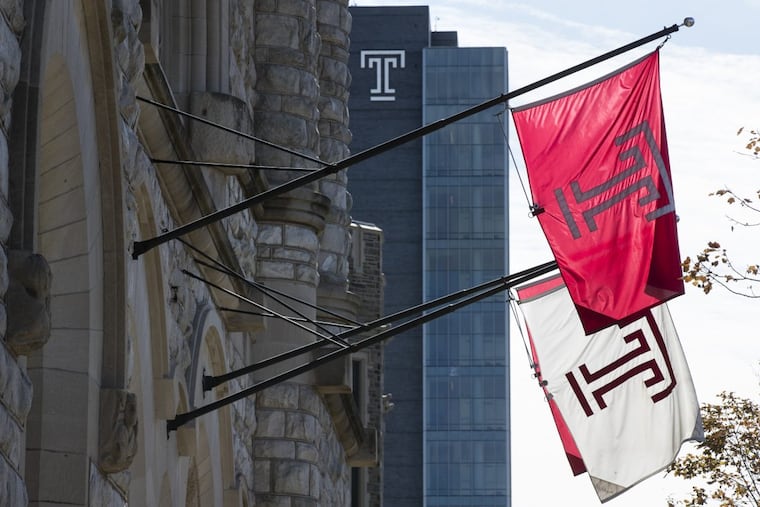The facts about Philadelphia’s ‘diversity university’ | Business Weekly Newsletter
Temple's plummeting share of Black students, and other stories.

Today we‘re bringing something new to the newsletter. Starting this week, we’ll give you an interesting metric, stat, or figure that’s important to the Philadelphia region, from economic indicators to price tags of major acquisitions. Check out the bottom of the newsletter to see our first “Big Number” that tracks the labor market recovery.
It’s part of our effort to make this newsletter more useful for you. So please let me know if you ever see a number we should highlight. Email me here with suggestions on what you’d like to see in the future.
For now, keep reading for a roundup of our best stories this week, including Temple’s shrinking share of Black students and a new Philly law banning many marijuana tests for new hires.
If this email was forwarded to you, you can sign up here to get this newsletter each week. And sign up for our email news alerts so you never miss our biggest stories.
— Christian Hetrick (@_Hetrick, businessweekly@inquirer.com)
Temple University’s campus and healthcare system are located in some some of the poorest neighborhoods in Philadelphia, one of the nation’s poorest big cities. But for many students from those low-income neighborhoods, the city’s only four-year public college “might as well be a million miles away,” our reporters Bob Fernandez and Susan Snyder write.
That’s because Temple has seen a plummeting share of Black students over the last 25 years, even as it rapidly expanded enrollment. Black students were 28.4% of Temple’s undergraduates a quarter-century ago, federal data show. By 2016-17, the share of Black students had bottomed out at 12.6%.
Among other factors, Temple has admitted students with higher SAT scores, hurting some Black applicants who graduate from high schools with fewer economic resources and who score lower on standardized tests. Also, Temple’s $30,500 price tag for in-state students makes it too expensive for many students.
Read more about Temple’s shrinking share of Black students.
What else you need to know ...
If you’re looking for a job in Philadelphia, you may no longer need to pass a drug test for marijuana. A new city law bars many employers from testing job applicants for cannabis use. It took effect Jan. 1.
But there are several exemptions to the ordinance. Here are some of the basics about the city’s ban on pre-hire marijuana testing:
Can my current employer still test me for marijuana use?
Yes. The ordinance applies only to pre-employment drug screenings. The law does not require employers to change their existing workplace drug policies, so your current employer can still test you for cannabis use.
Can employers still test me for other drugs?
Yes. The law applies only to marijuana testing, so you may still need to take a drug test for other substances before you’re hired.
Are any employees or employers exempt from the law?
Yes. If you work in law enforcement, need a commercial driver’s license, or supervise children, medical patients, people with disabilities, or other vulnerable populations, an employer can still test you for marijuana use as a condition of employment. There’s also a broader category of “any position in which the employee could significantly impact the health or safety of other employees or members of the public.”
Have more questions? Read more about Philadelphia’s new ban on pre-hire marijuana testing.
Other stories ...
For sale, still: Trinity Health Mid-Atlantic, which signed a preliminary agreement to buy Tower Health’s Chestnut Hill Hospital, will not complete the deal. Tower said it will continue exploring a sale.
Ye Renaissance Faire cries foul: Pennsylvania Renaissance Faire is suing the U.S. Small Business Administration over its denial of pandemic relief funds.
Better than PSERS: Money management is considered by some to be a complex science and art. But does it have to be? These humble county pension plans beat PSERS’ returns by keeping it simple.
It’s an improvement: Companies that get tax breaks from New Jersey are subject to better oversight, but the agency that oversees them hasn’t done enough to recover improper awards, a new report says.
The Big Number: 3.6 million jobs
The U.S. economy is still about 3.6 million jobs short of its pre-pandemic level, according to figures released Friday by the U.S. Bureau of Labor Statistics. To put that in perspective, COVID wiped out about 22.4 million jobs in 2020, so the U.S. has recouped about 84% of the jobs lost.
That may be a simpler way of tracking the labor market recovery. Friday’s jobs report said the U.S. unemployment rate fell to a healthy 3.9%, slightly above the 3.5% in February 2020. But businesses are still struggling to hire with many Americans reluctant to turn to the workforce.